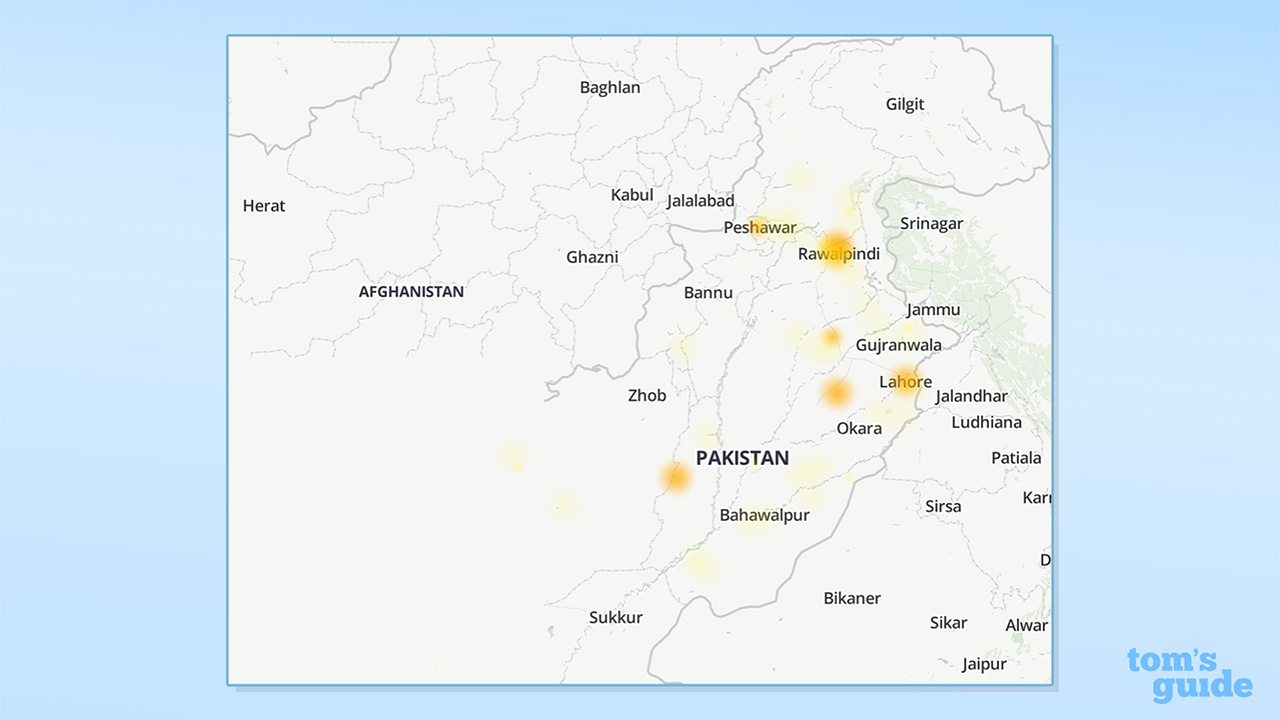WhatsApp is the next social media to go down in Pakistan – can you still contact relatives?
The messaging app is the latest platform to be hit by the ongoing government crackdown

Messaging app WhatsApp has become the latest platform to be swept up in the current wave of government crackdowns in Pakistan, as demand for the best VPNs has spiked.
Users began to report problems with WhatsApp on Saturday, November 23, and disruption continued throughout the weekend and into Monday, November 25. At the time of writing, it is unclear if the issues are still present.
Real-time outage monitor Downdetector reported significant spikes in outage reports on the evening of November 24 and the morning of November 25. Issues with sending and receiving voice notes and messages were reported and these were present on both the WhatsApp mobile and web apps.
Internet and cybersecurity watchdog NetBlocks also reported disruption, beginning on November 23.
⚠️ Confirmed: Live metrics show WhatsApp backends have been restricted in #Pakistan corroborating reports of media sharing issues; the measure comes as authorities tighten security ahead of protests planned by opposition party PTI calling for the release of former PM Imran Khan pic.twitter.com/aHYDLN934MNovember 23, 2024
Problems with WhatsApp came on the eve of political protests led by supporters of former Prime Minister Imran Khan and his PTI party. Khan is currently imprisoned on charges of corruption and leaking state secrets.
Ahead of the expected disruption, the government declared areas with security concerns would have their mobile and internet services suspended – as reported by AP News. The government did not specify which regions would be affected and for how long.
Downdetector shows that outage reports largely came from the Punjab region of Pakistan, an area which is seen as an area with strong PTI support. Pakistan's capital Islamabad is in the region, and is currently under lockdown. Former PM Khan is currently imprisoned in Rawalpindi, another city which has experienced high amounts of outage reports.
Furthermore, data from VPN Demand Statistics, run by Top10VPN, showed a 102% increase in VPN demand in Pakistan on November 25.

The story so far
This is not the first time people in Pakistan have experienced internet shutdowns and restrictions on social media apps.
Between November 9-10, Pakistan experienced a VPN shutdown, with the Proton VPN Observatory reporting a large spike in VPN usage. Run by the developers of one of the most secure VPNs, Proton VPN, the observatory noted a 350% increase in VPN sign ups over the two days. There have been reports that a second VPN shutdown is due to begin on November 25, although this has yet to be confirmed.
Following this shutdown, the country announced all non-commercial VPNs would be banned and only registered VPNs would remain. People and businesses have until November 30 to register their VPNs before the shutting-down takes place. VPNs were declared "un-Islamic," although this was later claimed to be a mistake.
Other social media apps have been targeted, such as X (formerly Twitter) and its supposed replacement, Bluesky. Both apps have been banned, but despite this, government ministers and departments have been tweeting from official X accounts – this is only possible by using a VPN.
What are the alternatives to WhatsApp?
WhatsApp can technically still be accessed via a VPN, although this may break Pakistani law.
There are alternative secure messaging apps available, most notably Telegram and Signal, which are amongst the best encrypted messaging apps. When comparing the two, Signal offers more privacy when it comes to messaging.
Signal's messages are end-to-end encrypted by default, whereas you have to switch to Telegram's Secret Chat mode to access this. Signal is user-friendly and can be used on mobiles and desktops. Your Signal account can be transferred from one Android device to another, and one iOS device to another. You can also keep your Signal account if you switch phone numbers – as long as your mobile device remains the same.
You do need a phone number to sign up to Signal, one of its only real downsides, and this is also the case for Telegram. Telegram has more features than Signal, and is a social-media platform of its own. However, as mentioned above, Telegram's chats are not encrypted by default and chats with more than two participants won't be end-to-end encrypted.
Moving forward
Those affected by WhatsApp's outage in Pakistan and anyone else who wants to ensure their messages are private should investigate alternative messaging apps that offer secure encryption.
The restrictions on WhatsApp are just another example of growing government restrictions on internet usage in Pakistan and are a cause for concern and will continue to be closely monitored.

George is a Staff Writer at Tom's Guide, covering VPN, privacy, and cybersecurity news. He is especially interested in digital rights and censorship, and its interplay with politics. Outside of work, George is passionate about music, Star Wars, and Karate.
